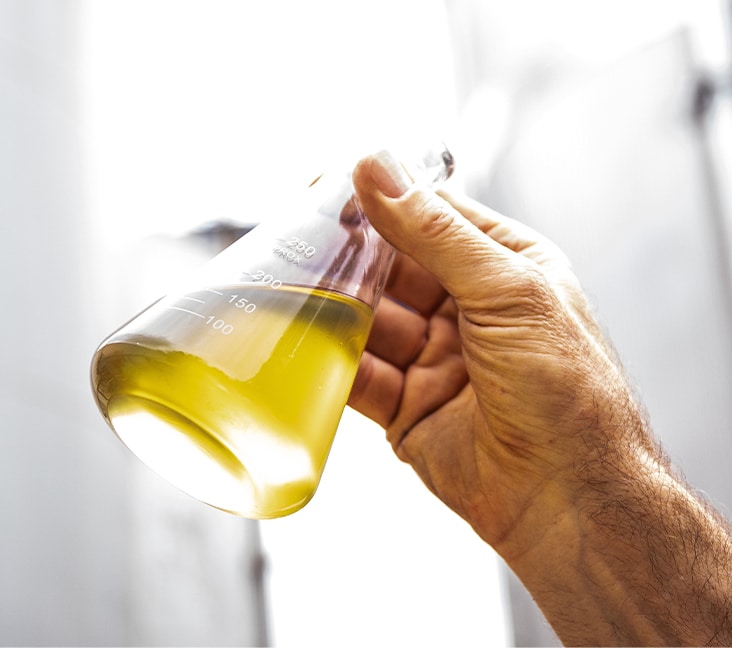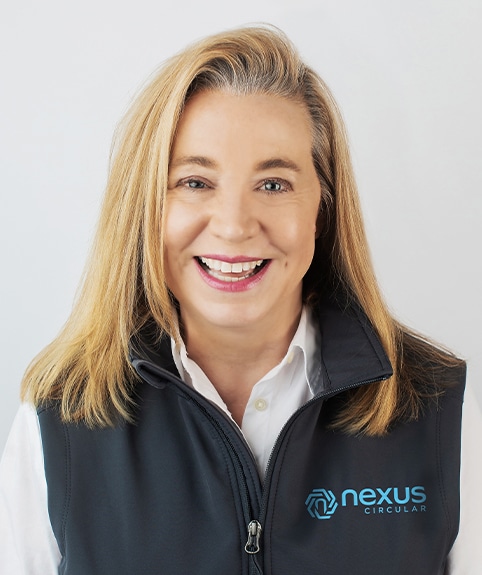Nexus Circular elevates plastic recycling to the next level. Operating at commercial scale, the company has diverted used plastic destined for landfills and converted it into a high-quality circular liquid that replaces fossil-based sources in the manufacture of sustainable virgin-quality plastics. Jeff Gold, company founder and present-day CTO and COO, provides insights on Nexus’ journey from a start-up with a mission to take plastics out of the environment to a significant player in the modern circular economy.
Jeff recalls that he randomly saw an article about a company that was converting plastic bags back into an oil-like product through a process called pyrolysis. He was instantly intrigued by the concept of pyrolyzing plastics into their basic building blocks, so they can be rebuilt into new plastics – creating a new pathway and an exciting incentive to remove them from the environment.
Pyrolysis was first used on plastics in the 1960s. When heated under pressure and without any oxygen, plastics break down into their basic building blocks that can be used to make new plastics. To be commercially viable, any new technology has to work and be affordable for the problem being solved. Jeff was passionate about creating a solution that would deliver economic value and could be successfully scaled.
An entrepreneur at heart and armed with curiosity and a background in practical chemistry, Jeff began converting plastics to oil in his spare time using a bench scale. Encouraged by the results, he founded Nexus and began testing every type of plastic to understand firsthand how it behaved in the pyrolysis process. Jeff learned that plastics like polyethylene (#2 and #4), polypropylene (#5) and polystyrene (#6) converted readily into their molecular building blocks. In contrast, plastics like polyethylene terephthalate (#1), polyvinyl chloride (#3) and others did not perform favorably, simply because of their chemical and molecular makeup.
In 2011, Nexus expanded from bench scale to a pilot production facility (Gen 1) at its headquarters in Atlanta, GA. Then the real work began to define the system’s boundaries, address scaling bottlenecks and optimize the production process to ensure it was economical. In 2014, Jeff partnered with Eric Hartz, cofounder and President, who shared his vision of economically building a world-changing company. And then, in 2015 Nexus gained the attention of Atlanta-based Cox Enterprises, whose initial investment in the company facilitated the next stage of growth and commercial expansion. Nexus commissioned its commercial production line (Gen 2) in 2018.
Although the initial effort focused on converting plastic waste into a liquid fuel for furnaces and boilers, Nexus believed there was a better circular application that could restore the productive use of the plastic molecule. Coincidentally, the petrochemical industry was working in parallel on processes that utilized the pyrolysis liquid to replace fossil-based feedstock in producing new plastics with virgin-equivalent quality. In 2019, Shell contacted Nexus about a project to use pyrolysis liquid in one of their ethylene crackers (plastics production facilities). This project provided the impetus for Nexus to shift to a fully circular solution and enabled the creation of new plastics from waste plastics. And the rest is history.
The past few years have brought new strategic partners and investors like Chevron-Phillips Chemical, Braskem, Dow and Printpack. Nexus proved it is possible to make circular products economically and at scale. The success of these efforts and relationships is facilitating the construction of an additional expanded commercial production line (Gen 3) at the Atlanta facility as well as new facilities across the US, including Chicago, Dallas and others yet to be announced. New facilities are also planned for Europe in the coming years. Demand for what Nexus has created is skyrocketing.
June 2022 marked another milestone … the shipment of the 100th truckload of circular liquid – all made from used plastics that would have otherwise been landfilled and instead replaced fossil-based feedstocks. This waste-derived “liquid gold” is the feedstock of the future to create circular plastic products. To date, Nexus has diverted almost 6 million pounds of used plastics from landfills. We are on a trajectory to convert 4 billion pounds of hard-to-recycle plastics into circular liquid by 2025 and 20 billion pounds by 2030 to meet our strategic partners’ commitments.
We truly are at the nexus of a circular game changer.

